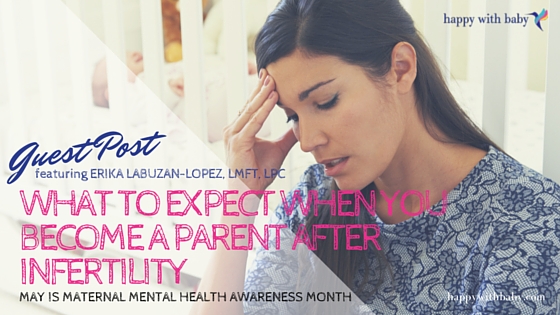Guest Blog Post: What to Expect When You Become a Parent After Infertility

IN HONOR OF MATERNAL MENTAL HEALTH AWARENESS MONTH THIS MAY, WE WILL BE FEATURING GUEST BLOGGERS, EACH OF WHOM BRING THEIR OWN UNIQUE EXPERTISE AND PERSPECTIVE TO THE DISCUSSION. IT IS MY HOPE TO HELP EDUCATE AND NORMALIZE THE EXPERIENCES OF ALL MOMS.
Guest Blog Post: What to Expect When You Become a Parent After Infertility
BY Erika Labuzan-Lopez, LMFT, LPC
During your infertility journey, all you dreamed of is the day that you’d become a parent. You worked so hard, read everything you could get your hands on, and asked questions in your online support group. You followed all of your doctor’s instructions, had sex on a schedule, and went through medical treatments you didn’t even know existed. It’s been a process, and you and your partner have experienced a grief that’s almost impossible to describe. But you’ve made it through. You finally got that BFP (Big Fat Positive), or your surrogate called with the good news, or the adoption agency has let you know you were matched. You finally heard those beautiful words you’ve been waiting for – “you’re going to be a parent.”
Everyone has expectations about what it will be like to become a parent no matter what the process was like. People that have gone through infertility are so happy to finally become parents, and rightfully so. That child is the rainbow after a storm. But the days aren’t always sunny after you become a parent. Parenthood is considered to be one of the most stressful times in a person’s life, conflict increases for 92% of couples, and about 1 in 7 mothers and 1 in 10 fathers experience a postpartum mood disorder. There are a few aspects of parenthood after infertility that can be particularly challenging. I encourage you to learn more about these and accurately prepare yourself for the postpartum period in the same way that you had to learn to cope with infertility.
Your Vulnerability is Heightened due to the Pain and Grief of Infertility
The brain is fascinating, and one of the most interesting functions of the brain is that there are specific neurotransmitters (chemical signals) released when you become a parent that allow you to become more open or vulnerability in order to bond with your baby. This is a wonderful function that our bodies are prepared to do, but even in parents that didn’t go through infertility, it can be a challenge. This increased vulnerability can be new and you may not be equipped to handle it, which results in numerous problems during the postpartum period. But think about this, going through infertility has already put you in a very vulnerable place, one you likely haven’t experienced before. Entering parenthood in an already heightened state or a place of unresolved grief from the infertility process can present unique challenges. I suggest discussing your emotions and expectations about parenthood with your partner, going to a class designed to prepare you for the emotional and relationship changes that come with parenthood, and if possible speaking to an expert or therapist that is familiar with infertility to help you process your emotions and close that chapter fully before entering another stressful time.
There’s Added Pressure to “Get it Right”
After going through infertility, you understand or have the idea that this may be your only chance to become a parent. Everyone has false expectations of what it’s like to become a parent, but there’s this added pressure (often self-imposed) to be the perfect parent because you went through so much to get here. Although you may not believe it, there’s no such thing as being a perfect parent, and trying to be perfect all the time sets you up for failure. Getting pregnant is something that’s seen as “easy” or “something your body is made to do,” so when it’s not so easy it feels like you’re a failure as a partner and as a woman/man. Failure is a feeling you know well and is extremely difficult as it then evokes shame. There’s absolutely no shame in being an imperfect parent or being infertile. Take it easy on yourself, and engage in self-compassion techniques.
False Expectations that Becoming Parents will Repair What Infertility Has Done to Your Relationship
Infertility takes a huge toll on any relationship. Most couples stay together and feel that the experience was meaningful and made them closer, and some couples do not make it through the process and end up separating. Either way, these couples have put in a lot of effort to get through a tragic time and strive. But becoming parents will not magically solve or heal the pain that infertility has posed to you and your relationship. It’s a wonderful outcome, and something that you both welcome whole heartedly. However, it is necessary to address the damage that has been done and heal the wounds that were inflicted because they haven’t gone away. That wound will shrink and heal, but the scar will always be there. If it’s not looked at, that could be dangerous. Find a great couples therapist (preferably that has infertility or postpartum knowledge) that can help to heal these wounds and strengthen the relationship simultaneously.
May is Maternal Mental Health Awareness Month, and I am honored to be able to help raise awareness and reduce the stigma around struggles in the postpartum period. As an infertility specialist, I want to highlight the experience that you all go through after becoming parents. For more resources, visit Resolve.org or search for a local support group. While these are challenging times, what you’re going through is normal. Find a way to heal, build a support network, lean on your partner, be kind to yourself, and grow a family that thrives.

I am a Licensed Marriage and Family Therapist located in the Clear Lake area of Houston, Tx. My specialties include couples therapy, infertility counseling, and the transition to parenthood. I help couples dig in deep and explore the underlying issues that come with infertility, new parenthood, and simply being in a relationship. While your life will never be the same after experiencing infertility or starting a family, you need to know that your relationship can be amazing, strong, and even better than before.
Check Out Erika's Work at www.ErikaLLTherapy.com
Find Erika on Social Media:
Twitter: @ErikaLLTherapy
Subscribe
Sign up to get the latest weekly blogs sent straight to your inbox


0 comments
Leave a comment
Please log in or register to post a comment